Cybersecdn– In a bold move that pits local autonomy against state authority, the City of Columbus, Ohio, is gearing up for a legal showdown over a controversial state law that bans municipalities from regulating tobacco sales within their jurisdictions. This legal challenge is not just about tobacco; it’s a litmus test for the balance of power between Ohio’s state legislature and its cities, each vying to set the agenda on public health and local governance.
The genesis of this conflict can be traced back to late 2022 when Columbus City Council voted decisively to ban the sale of flavored tobacco products, a move aimed at curbing the city’s smoking rates and protecting public health.
This local ordinance was a direct response to alarming health statistics, such as those from Cleveland, where the smoking rate is a staggering 35%—more than three times the national average. The local government’s initiative to tackle smoking head-on, however, was met with a swift and sweeping countermeasure from Ohio’s state legislature.
In December 2022, just two days after Columbus’s bold move, Ohio Republican lawmakers introduced a rider to a tobacco tax bill that would strip all cities and municipalities of the power to regulate smoking, vaping, and e-cigarette sales. This provision was a direct reaction to Columbus’s ordinance, signaling the state’s intention to centralize control over tobacco regulation. The battle lines were drawn.
Governor Mike DeWine’s veto of the bill in early January 2023, citing the importance of local decision-making in protecting children from flavored tobacco products, provided a reprieve for cities like Columbus and Cleveland. However, this was short-lived. In a dramatic turn of events, the Ohio legislature overrode the governor’s veto, first in the House and then in the Senate, cementing the state’s authority over tobacco regulation.
The new law, set to take effect in April 2023, is comprehensive in its restrictions. It not only prevents cities from banning specific types of tobacco products, like flavored vapes but also from conducting their own health inspections of tobacco retailers. This broad preemption of local regulatory powers has ignited a fierce debate over the principle of home rule—a constitutional provision that grants Ohio cities and villages the right to self-governance in areas not explicitly covered by state law.

Columbus City Attorney Zach Klein’s vow to file a lawsuit against the state underscores the city’s determination to defend its right to protect public health at the local level. Klein argues that the state’s “patchwork” argument—claiming that uniform state laws are necessary to avoid confusion—is flawed, suggesting that it undermines the very essence of municipal autonomy.
The unfolding legal battle in Ohio is more than a dispute over tobacco sales; it’s a critical examination of the balance of power within the state. It raises fundamental questions about the extent to which state governments can impose their will on cities and whether local communities have the autonomy to address public health crises in ways that reflect their unique challenges and values.
Read More: Jury Clears Man in Hate Crime Case Against Blind Asian Victim!
McConnell Critiques Biden’s ‘Hit-or-Miss’ Strategy as a National Security Threat!
Subway Alert: Notorious Box Cutter Offender Re-Arrested in NYC!
As Columbus prepares to confront the state in court, the outcome of this legal challenge will have far-reaching implications, not just for tobacco regulation, but for the broader dynamics of state-local governance in Ohio and potentially beyond. The eyes of public health advocates, legal experts, and policymakers across the nation will be watching closely, as this case could set a precedent for how states and municipalities navigate the complex terrain of regulatory authority and local autonomy in the future.

